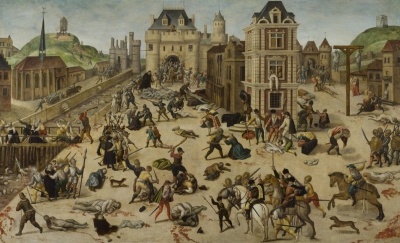The St. Bartholomew's Day massacre (French: Massacre de la Saint-Barthlemy) in 1572 was a targeted group of assassinations and a wave of Catholic mob violence, directed against the Huguenots (French Calvinist Protestants) during the French Wars of Religion. Traditionally believed - at least in Protestant circles - to have been instigated by Queen Catherine de' Medici, the mother of the young reigning King Charles IX,
the massacre started a few days after the marriage on 18 August of the king's sister Margaret to the Protestant Henry of Navarre (the future Henry IV of France). Many of the wealthiest and most prominent Huguenots had gathered in largely Catholic Paris to attend the wedding.
The massacre began in the night of 2324 August 1572, the eve of the feast of Bartholomew the Apostle, two days after the attempted assassination of Admiral Gaspard de Coligny, the military and political leader of the Huguenots. King Charles IX ordered the killing of a group of Huguenot leaders, including Coligny, and the slaughter spread throughout Paris. Lasting several weeks in all, the massacre expanded outward to the countryside and other urban centres. Modern estimates for the number of dead across France vary widely, from 5,000 to 30,000.
The massacre marked a turning point in the French Wars of Religion. The Huguenot political movement was crippled by the loss of many of its prominent aristocratic leaders, and many rank-and-file members subsequently converted. Those who remained became increasingly radicalized. Though by no means unique, the blood-letting "was the worst of the century's religious massacres". Throughout Europe, it "printed on Protestant minds the indelible conviction that Catholicism was a bloody and treacherous religion".
The French Wars of Religion were a prolonged period of war and popular unrest between Catholics and Huguenots (Reformed/Calvinist Protestants) in the Kingdom of France between 1562 and 1598. It is estimated that three million people perished in this period from violence, famine, or disease in what is considered the second deadliest religious war in European history (surpassed only by the Thirty Years' War, which took eight million lives).Much of the conflict took place whilst Queen mother Catherine de' Medici, widow of Henry II of France, held significant political influence. It also involved a dynastic power struggle between powerful noble families in the line for succession to the French throne: the wealthy, ambitious, and fervently Catholic ducal House of Guise (a cadet branch of the House of Lorraine, who claimed descent from Charlemagne) and their ally Anne de Montmorency, Constable of France (i.e., commander in chief of the French armed forces) versus the less wealthy House of Condé (a branch of the House of Bourbon), princes of the blood in the line of succession to the throne who were sympathetic to Calvinism. Foreign allies provided financing and other assistance to both sides, with Habsburg Spain and the Duchy of Savoy supporting the Guises, and England supporting the Protestant side led by the Condés and by the Protestant Jeanne d'Albret, Queen of Navarre and wife of Antoine de Bourbon, Duke of Vendôme and King of Navarre, and their son, Henry of Navarre.
Moderates, primarily associated with the French Valois monarchy and its advisers, tried to balance the situation and avoid open bloodshed. This group, pejoratively known as Politiques, put their hopes in the ability of a strong centralized government to maintain order and harmony. In contrast to the previous hardline policies of Henry II and his father Francis I, they began introducing gradual concessions to Huguenots. A most notable moderate, at least initially, was the queen mother, Catherine de' Medici. Catherine, however, later hardened her stance and, at the time of the St. Bartholomew's Day massacre in 1572, sided with the Guises. This pivotal historical event involved a complete breakdown of state control resulting in series of riots and massacres in which Catholic mobs killed between 5,000 and 30,000 Protestants over a period of weeks throughout the entire kingdom.
By the conclusion of the conflict in 1598, the Protestant Henry of Navarre, heir to the French throne, had converted to Catholicism and been crowned Henry IV of France. In that year, he issued the Edict of Nantes, which granted Huguenots substantial rights and freedoms. His conversion did not end Catholic hostility towards Protestants or towards him personally, and he was eventually murdered by a Catholic extremist. The wars of religion threatened the authority of the monarchy, already fragile under the rule of Catherine's three sons and the last Valois kings: Francis II, Charles IX, and Henry III. This changed under the reign of their Bourbon successor Henry IV. The Edict of Nantes was revoked later in 1685 with the Edict of Fontainebleau by Louis XIV of France. Henry IV's governance and selection of able administrators left a legacy of strong centralized government, stability, and relative economic prosperity.

1572Aug, 23
French Wars of Religion: Mob violence against thousands of Huguenots in Paris results in the St. Bartholomew's Day massacre.
Choose Another Date
Events on 1572
- 16Jan
Ridolfi plot
Thomas Howard, 4th Duke of Norfolk is tried for treason for his part in the Ridolfi plot to restore Catholicism in England. - 1Apr
Capture of Brielle
In the Eighty Years' War, the Watergeuzen capture Brielle from the Seventeen Provinces, gaining the first foothold on land for what would become the Dutch Republic. - 18Aug
Henry IV of France
Marriage in Paris, France, of the Huguenot King Henry III of Navarre to Margaret of Valois, in a supposed attempt to reconcile Protestants and Catholics. - 23Aug
St. Bartholomew's Day massacre
French Wars of Religion: Mob violence against thousands of Huguenots in Paris results in the St. Bartholomew's Day massacre.

 English
English  español
español  français
français  português
português  русский
русский  العربية
العربية  简体中文
简体中文 